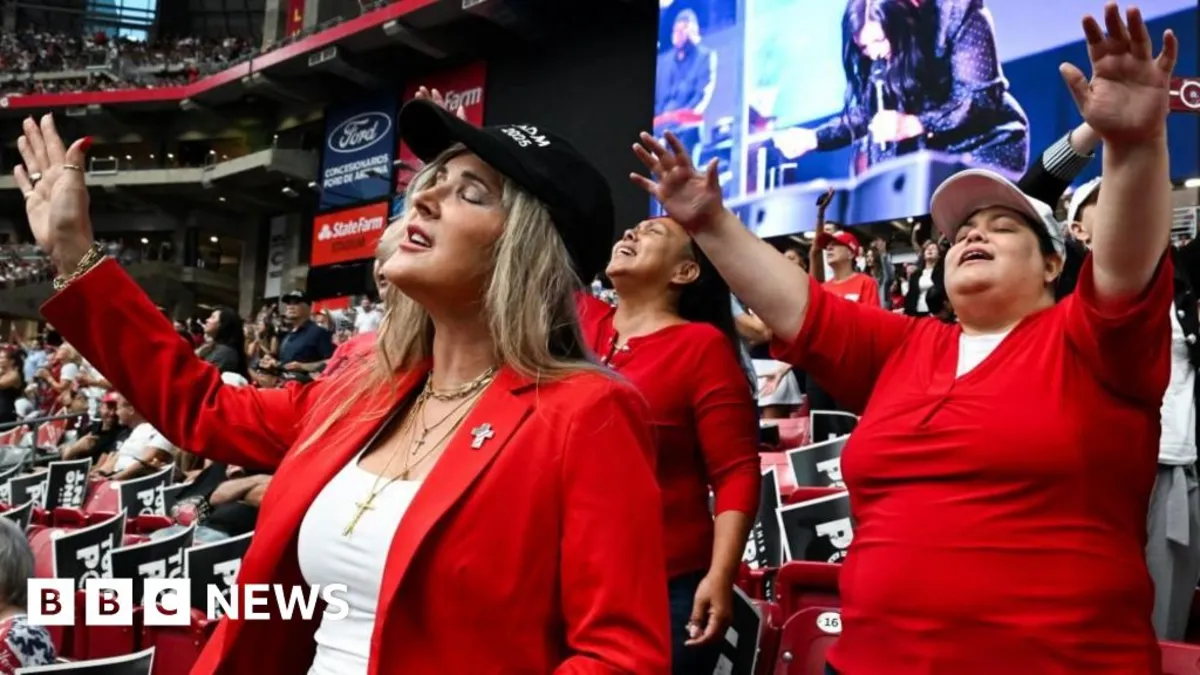
The recent event in Arizona honoring conservative activist Charlie Kirk was a unique convergence of a memorial service, a big-church Christian revival, and a political rally. This gathering provided an insightful look into the current state of the Republican Party, presenting a pivotal choice between forgiveness and retribution, reconciliation and conflict. The leading figures of President Donald Trump's Make America Great Again coalition came together for an hours-long celebration of Kirk's life, featuring music and numerous speeches that hinted at the future trajectory of Trump's MAGA movement, a decade after it reshaped American politics.
Despite being overshadowed by a lineup of prominent politicians, the most defining moment of the evening occurred when Erika Kirk, Charlie's widow, took the stage. The 36-year-old former beauty contestant, podcaster, and businesswoman delivered a compelling message of unity, advocating for forgiveness towards her husband's killer. "The answer to hate is not hate," she declared, her voice filled with emotion. "The answer, we know from the Gospel, is love and always love." This powerful speech showcased her ability to navigate the harsh spotlight following her husband's tragic death.
Last week, Turning Point USA appointed Erika as the head of the conservative youth organization founded by her late husband, a move that signals a new wave of energy and determination in the wake of Kirk's murder. Sunday night affirmed Erika Kirk's potential to become an influential public figure in Arizona, a crucial battleground state. Her message stood in stark contrast to the often confrontational tone prevalent in modern American politics.
While Erika Kirk offered a vision of a more compassionate conservative movement, Donald Trump, who spoke immediately following her, reminded attendees of the Republican Party's current priorities. "I hate my opponents, and I don't want what's best for them," Trump quipped, underscoring a stark contrast to his widow's sentiments. His comments followed a recent post on Truth Social, where he urged his Justice Department to pursue legal action against political adversaries, including Senator Adam Schiff and former FBI Director James Comey.
Trump's remarks during the memorial service were strikingly discordant, yet he was not alone in using the occasion to rally against perceived enemies. Senior White House adviser Stephen Miller declared, "We are the storm," asserting that conservatives would vigorously defend their values and traditions against what he described as the "wickedness" of their opponents.
Although the event contained moments of dissonance, the overarching theme resembled a religious revival reminiscent of historic evangelical movements. The memorial celebrated Charlie Kirk's Christian faith and sought to inspire a renewed enthusiasm among young Americans for traditional values. Tens of thousands filled the stadium, with millions more tuning in online, a promising sign for conservative leaders advocating for a greater role for Christianity in American public life.
Despite a noticeable decline in religious affiliation among younger Americans, Charlie Kirk's legacy may ignite a religious awakening among this demographic. However, the evangelical rhetoric present during the event could also risk deepening cultural and political divides, rather than fostering unity.
As Trump embarks on his second term, the event may have also marked an early stage in the competition for the 2028 Republican presidential nomination. Three potential candidates—Vice-President JD Vance, Secretary of State Marco Rubio, and Health Secretary Robert F. Kennedy Jr.—each delivered speeches that emphasized their personal connections with Kirk, while also hinting at their political ambitions. Vance proclaimed, "For Charlie, we will rebuild this United States of America to greatness," while Kennedy reflected on how Kirk altered the course of history.
Though Trump was a prominent figure at the event, he did not dominate the stage as he often does at political gatherings. This allowed attendees to glimpse emerging leaders who may play pivotal roles in the Republican Party's future, indicating a potential shift in dynamics as the party contemplates its next steps without Trump at the helm.
Overall, the memorial for Charlie Kirk encapsulated the complexities and contradictions within the modern Republican Party, showcasing both a call for unity and a rallying cry against enemies, all while hinting at the potential for new leadership and direction in the years to come.